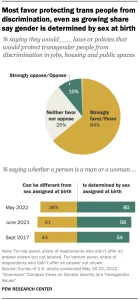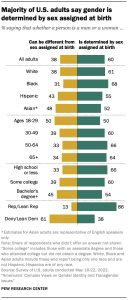Widening acceptance of gay and lesbian people in American life is not as easily translating to understanding of transgender persons, a new national survey by Pew Research shows.
Despite the rapid change in American attitudes on same-sex attraction, the fundamental question of gender identity posed by transgender persons is going the other way. Pew found this year a growing number of Americans believe a person’s gender is determined by their sex at birth.
Pew previously reported from the same survey data that 1.6% of U.S. adults identify as transgender or nonbinary and that more than 40% of U.S. adults know someone who is transgender.
Transgender persons almost universally explain that they know — often from a young age — that who they are on the inside does not match the gender they appear to be on the outside. This creates a psychological diagnosis called “gender dysphoria.” Modern medicine and experience have found the most effective treatment for gender dysphoria is to live into the desired gender. Thus, a person identifies as trans-gender.
 Yet in spite of the testimony of transgender persons and accumulating scientific data, gender identity remains one of the most difficult things for many Americans to understand amid a rapidly changing culture.
Yet in spite of the testimony of transgender persons and accumulating scientific data, gender identity remains one of the most difficult things for many Americans to understand amid a rapidly changing culture.
Currently 60% of U.S. adults believe whether a person is a man or a woman is determined only by their sex assigned at birth. This is up four points from one year ago and six points from five years ago.
And although religious conservatives and Republican politicians are capitalizing on fears about transgender persons, the overall uptick in lack of understanding transcends those labels. Pew reports: “No single demographic group is driving this change, and patterns in who is more likely to say this are similar to what they were in past years.”
Demographics do make a difference in viewpoint on gender identity, to be sure.
Adults 18 to 29 are the least likely (50%) to say gender is determined solely by sex assigned at birth. That compares to 60% of 30- to 49-year-olds who say the same and 66% of 50- to 64-year-olds.
And political identity remains an enormous influence on this question.
Pew explains: “The vast majority of Republicans and those who lean toward the GOP say gender is determined by sex assigned at birth (86%), compared with 38% of Democrats and Democratic leaners.”
Liberal Democrats are most likely (61%) to believe whether a person is a man or a woman can be different from their sex assigned at birth, while 92% of conservative Republicans believe gender is determined by sex at birth and 74% of moderate or liberal Republicans agree.
Over the past few years, Republican governors and legislators have seized upon such knowledge to appeal to their base voters with hundreds of bills and new laws restricting medical care and athletic competition for transgender persons.
Although transgender persons get lumped into the alphabet of LGBTQ identity, there always has been an uneasy alliance between the gay community and the transgender community. Being transgender is about gender identity, which is different than being gay or lesbian, which is about sexual orientation. And to say whether a transgender person is also “gay” depends on the individual and on how the terms are defined.
Demographers have called the sea change of acceptance of same-sex relationships one of the most rapid cultural shifts ever recorded in American history. Support for same-sex marriage moved from 27% in 1996 to 71% today.
Transgender Americans have not enjoyed the same benefits.
 In fact, 38% of American adults believe society has gone too far in accepting transgender persons. Those most likely to hold such a view are men, white people and those without a four-year college degree.
In fact, 38% of American adults believe society has gone too far in accepting transgender persons. Those most likely to hold such a view are men, white people and those without a four-year college degree.
Again, Pew reports “a wide partisan divide” on this question as well. While 58% of Democrats believe society hasn’t gone far enough in accepting people who are transgender, 66% of Republicans say society has gone too far in its acceptance.
Overall, 43% of American adults believe attitudes about people who are transgender or nonbinary are changing too quickly, while 26% say things aren’t changing quickly enough and 28% say the pace of change is about right. There is a wide partisan divide on this question too.
Pew researchers asked respondents an open-ended question about why they think American views on gender identity are changing too quickly or not quickly enough.
Religious beliefs were one of the common reasons given. Some examples of the verbatims:
- “People now believe everyone should just forget about their birth identity and just go along with what they think they are. God made us all for a reason and if he intended us to pick our gender then there would be no reason to be born with specific male or female parts.”
- “I have a personal religious belief that sex is an essential part of our eternal identity and that identifying as something other than you are … just doesn’t make a lot of sense.”
- “I believe God created a man and a woman. We have overstepped our bounds in messing with the miracle of life. I side with my creator.”
Although more misunderstood and perhaps feared than the gay community, transgender persons did get some better news in the latest Pew study:
- Nearly half of adults (47%) said it’s important to use someone’s new name if they change their name as part of a gender transition.
- Eight in 10 U.S. adults believe there is at least some discrimination against transgender people in American society, and a majority (64%) favor laws that would protect transgender individuals from discrimination in jobs, housing and public spaces.
- And 44% believe forms and online profiles that ask about a person’s gender should include options other than “male” and “female” for people who don’t identify as either.
Pew’s nationally representative survey of 10,188 U.S. adults was conducted May 16-22.
Related articles:
Why being transgender is not a sin | Opinion by Mark Wingfield
Here’s a better way to talk about Lia Thomas and transgender athletes | Analysis by Rick Pidcock
Texas officials’ new attack on transgender care called a ‘political ploy’ at the expense of children


